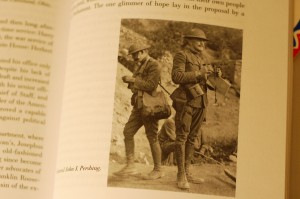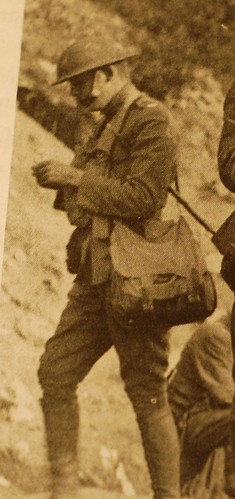You know, it just goes to show that you really can’t separate your own life, your own time, your own thought-processes from your historical research.
I was reading a book about the first two decades of the twentieth century (Pivotal Decades by John Milton Cooper), and came across this photo of General Pershing from WWI. You know, from around 1917-1918 or so?
See the man in the background?
Even knowing that this photo is over ninety years old, the posture was so familiar, so ever-present …
… My first thought was that he was texting someone or checking his email or tweeting, or something.
Yes, this makes me a momentary idiot. (Or at least, I hope it was just momentary.) But it also stopped me mid-chew as I ate my lunch.
How many other things do we take for granted just because they seem familiar to us … even when they’re not. I’m not sure what this soldier is doing–tying a knot? Checking a bullet? Folding a vital military order? Picking at a hangnail? Doing some obscure 1917 thing that has disappeared from usage in the last century? But I’m pretty confident in saying that he is NOT scrolling through music on his MP3-player. You know, unless he was a time-traveller who wasn’t paying attention to the photographer.
The point, though, is that no matter how hard we may try not to, we’re always going to perceive the world through what we KNOW.
History, religion, table manners … everything. We can know that Amish people don’t use electricity, but can we really understand what that means on a daily basis? We can know that a couple centuries ago, it might take months to deliver mail across country, but that seems impossible to people who mostly communicate instantaneously. And who can’t really imagine what a difference the telegraph made when it spread like wildfire around the world.
People say the only way to know another person is to walk a mile in their shoes–even if just in your imagination. The trick, though, is that those shoes aren’t going to fit, no matter how well they’re made, because your feet are used to the world you walk. Anything else is too unfamiliar for secure footing … and it’s when you make assumptions that you’re going to get into trouble.



I am actually quite fond of anachronisms in my dreams because they are downright entertaining. One of the dreams that amused me the most was one that took place in ancient China. I saw people in traditional clothing and used horses and carriages for transportation. It was real funny when they pulled up the horse and carriage to the curb and handed their keys to the valet guys. There were also people frustrated with parallel parking and backing their horses into spaces. I am sure all these things took place in some form, but they were still quite entertaining.
While I do agree that we will always perceive the world according to what we know, it is also probable for us to adopt when the unexpected comes. After all, life is full of surprises, and when we are stuck with only what we know, expanding our horizon would be impossible.
Just a thought. 🙂
Well, of course. Humans are forever changing, learning, adapting. We love inventing new things and are never satisfied with the status quo. The point is that, even knowing that, we have to start somewhere. We all have a base line of “this is the way things are NOW,” and it’s ever-changing.
The trick is remembering that our assumptions of “the way things are” are all based on our own personal knowledge, so that we make allowances and realize that that base line is going to be different for different cultures, different times, different people.